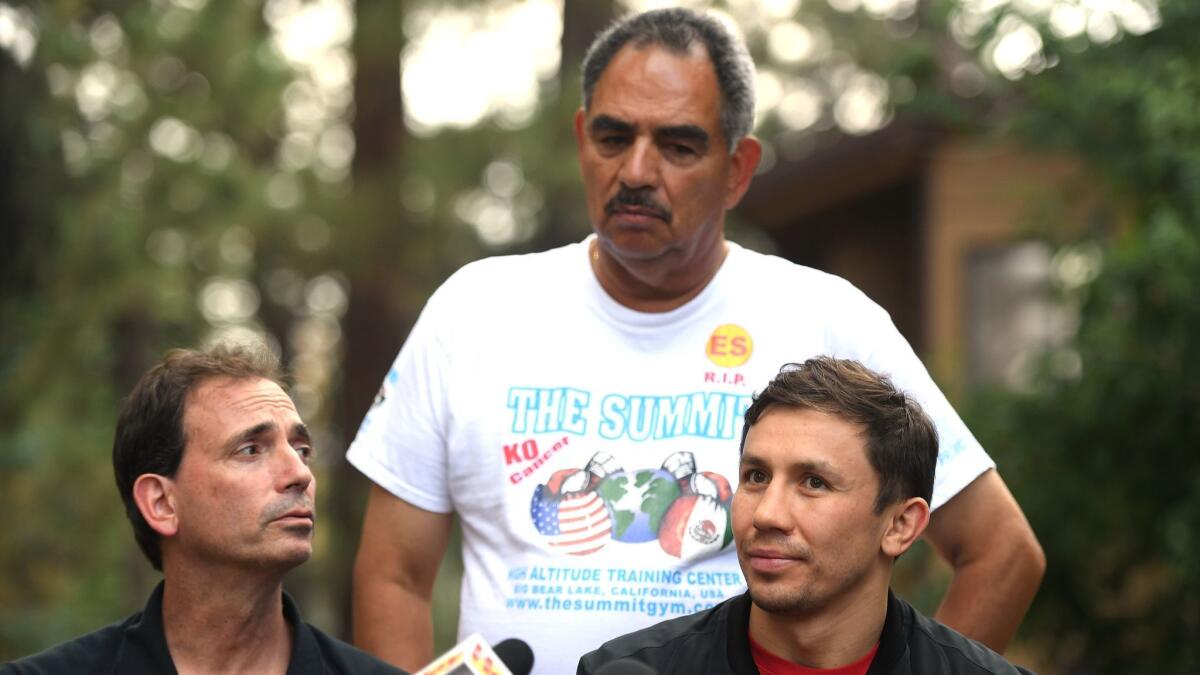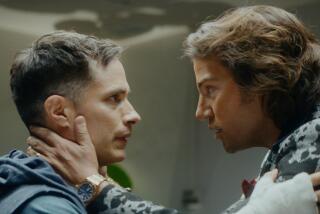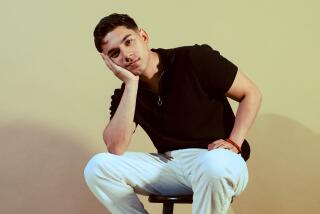Column: He’s funny, provocative and the reason Gennady Golovkin and Canelo Alvarez want to destroy each other

Reporting from Las Vegas — How is it possible for Canelo Alvarez to ingest contaminated meat in Mexico when his trainers are literally butchers?
“They own meat markets,” Abel Sanchez said.
How can Alvarez claim to be upholding Mexico’s boxing tradition when he was backpedaling for the most of his draw against Gennady Golovkin last year?
“He fought a great fight not to be knocked out,” Sanchez said.
And how can Alvarez say with a straight face that he couldn’t knock out Golovkin because he fought with an injured right hand?
“My earlobe hurts,” Sanchez said sarcastically.
In the vitriolic buildup to the rematch between Alvarez and Golovkin on Saturday, which included the cancellation of a Cinco de Mayo date because Alvarez failed a drug test, Sanchez has provided a steady stream of one-liners that are playful as they are inflammatory. The personality of Golovkin’s 62-year-old trainer has dominated the promotion, so much so that Alvarez believes the Southern California-based cornerman is also responsible for the cutting remarks made by Golovkin.
“They are Abel’s words,” Alvarez said in Spanish. “Golovkin doesn’t have the courage to say that on his own or to even think it. Everything he says, he says because of Abel.”
Shortly after the combatants and their teams made public appearances Tuesday at the MGM Grand to open fight week festivities, Alvarez acknowledged Sanchez has made the upcoming confrontation personal. The feeling isn’t mutual.
“It’s part of the promotion, man,” Sanchez said. “It’s nothing personal. I think we have to tell the public that it’s important to tune in because we’re pissed off at each other.”
There are tickets and pay-per-view broadcasts to sell. The rematch has failed to generate the same level of excitement as the initial encounter, evidenced by how tickets are still available. The first contest sold out more than two months in advance.
Golovkin is from Kazakhstan and Alvarez is from Mexico. Neither communicates well in English, so Sanchez is speaking for them.
When Sanchez does something, there is always a purpose. His words and actions are part of a larger-scale plan.
A former contractor, Sanchez compares preparing for a fight to building a house.
“I love the development of things, the making of things,” Sanchez said. “You have a slab and you have a pile of lumber and a bunch of nails and a set of plans and you build something. I guess that’s the same thing with a fighter. You get a kid who doesn’t know anything or knows less than what you want to teach them and six months later, a year later, you have something that’s nice, something that you envisioned.”
Born in Tijuana and raised in Southern California, Sanchez was introduced to construction by his adoptive father, Army veteran Ben Sanchez.
“My father was very strict,” Sanchez said. “He woke up at five in the morning and everyone woke up at five in the morning. That’s just the way it was.”
When Sanchez was nine or 10, his father started taking him to work.
“He taught me the trade,” Sanchez said. “I think it completely shaped my life. It taught me commitment to something, commitment to starting and finishing something.”
Shortly after graduating from Edgewood High in West Covina, where he played on the same baseball team as future major leaguers Gary and Ron Roenicke, Sanchez started his own construction business. He picked up taekwondo on the side, then boxing.
He scaled back his boxing activities to focus on work, only to suddenly find himself more immersed in the sport than ever. A young fighter he once befriended, Lupe Aquino, had retired because of problems with the trainer provided to him by his management team. Sanchez asked him if he would return if he trained him. Aquino agreed.
In 1987, fighting for only the fourth time with Sanchez in his corner, Aquino became the super welterweight champion of the world.
That prompted Aquino’s management team to introduce Sanchez to a couple of brothers they had under contract: Terry and Orlin Norris. Terry Norris became a 154-pound champion in 1990 and was considered one of the top fighters in the world. Orlin Norris became a cruiserweight champion in 1993.
“So my first three fighters out of the gate were world champions,” said Sanchez, who has now trained 18 world champions.
Sanchez compensated for his lack of boxing experience by watching countless videos of great champions, his favorite being Alexis Arguello.
He taught an offensive style that appealed to the masses, explaining like only he could, “I feel we owe it to the fans to entertain them. They say some people like the sweet science, but I can tell you that’s only 5-10%. We don’t go to the bullfights to see the bullfighter win. We go to see the bullfighter get thrown up in the air, right? And then we say, ‘I hope he’s OK.’ No you don’t. You hope he’s gored.
“That’s the way we are. We live in a morbid society. You go to fights, you want to see somebody get knocked out. Then he gets knocked out really bad and you say, ‘Oh God, I hope he’s OK.’ Two minutes ago, you were hoping he got the [expletive] kicked out of him. That’s what people want to see.”
Sanchez made it a point to offer his fighter simple instructions, similar to how Hall of Fame trainer Emanuel Steward did.
“I liked how he talked to you in a manner that’s not trying to confuse you,” Sanchez said. “He’s talking to you in a way you understand. We’re not rocket scientists here. Sometimes, a coach talks too much. Sometimes, you just have to let things develop and go from there. Sometimes, we try to impart so much wisdom, you’re confusing the subject.”
Sanchez found his calling. He was a teacher.
His children can attest to that. His daughter, Brandie, is the manager of an escrow company. His middle child, Abel Jr., travels the world as a representative for the Mayo Clinic. His other son, Leonard, is finishing his studies at Long Beach State. They attribute their success to the discipline their father instilled in them as children.
“He expected us to be no less than perfect,” Leonard said.
Golovkin has become Sanchez’s most famous student. When Golovkin’s managers called him in 2010 asking whether he would consider working with the middleweight from Kazakhstan, Sanchez wasn’t training any fighters. Discouraged by the lack of commitment from the fighters in his stable, he had stepped away from the sport years earlier.
Golovkin said he became interested in training under Sanchez after watching a video of Terry Norris’ victory over a faded Ray Leonard in 1991. In Golovkin, Sanchez discovered a kindred spirit who shared his work ethic.
By the end of 2010, Golovkin won a share of the middleweight championship. His draw with Alvarez last September was the first blemish on his record.
The depth of the bond Golovkin shares with Sanchez is obvious to anyone who has spent any time around them. Before entering the ring for his previous fight, Golovkin walked around the periphery of the floor seats at StubHub Center to show appreciation to his fans. Golovkin’s left hand was on Sanchez’s right shoulder for the entire march.
Sanchez has taught Golovkin more than how to fight. He’s also passed on his sense of humor.
Asked about Sanchez, Golovkin used the opening to crack a joke at Alvarez’s expense.
“What I’m really thankful to Abel for,” Golovkin said, “is not bringing any illegal and banned substances into my fighting career.”
Follow Dylan Hernandez on Twitter @dylanohernandez
More to Read
Go beyond the scoreboard
Get the latest on L.A.'s teams in the daily Sports Report newsletter.
You may occasionally receive promotional content from the Los Angeles Times.











